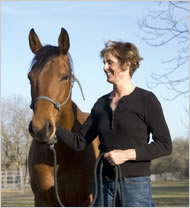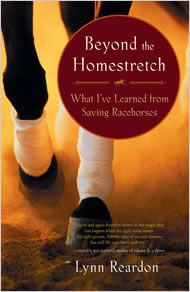
And photographs, if you have any.
Horseytalk.net Special Interview
Lynn Reardon
 "When I meet new people in social settings, my favorite
moment is when I’m asked what I do for a living.
The answer — “I run a nonprofit racehorse adoption
ranch” — often creates a flurry of eager questions.
"When I meet new people in social settings, my favorite
moment is when I’m asked what I do for a living.
The answer — “I run a nonprofit racehorse adoption
ranch” — often creates a flurry of eager questions.
"My work is varied, often straddling the line between farm hand, equine psychologist, horse wrangler and kindergarten teacher. And I enjoy telling entertaining stories about the vivid racehorse personalities I’ve encountered."
Lynn Reardon is the founder and executive director of LoneStar Outreach to Place Ex-Racers (LOPE Texas), a nonprofit racehorse placement agency near Austin. Before founding LOPE, Lynn worked in nonprofit finance and administration in the Washington, D.C.-area for too many years.
Lynn now lives on the LOPE ranch with her husband, Sophie the dog, multiple cats and a herd of ex-racehorses up for adoption. Lynn has adopted three LOPE horses of her own: Tulsa Mambo, Sally and Lightening Ball.
Lynn Reardon.
A rescuer of racehorses.
She tells her story.
When I meet new people in social settings, my favorite moment is when I’m asked what I do for a living. The answer — “I run a nonprofit racehorse adoption ranch” — often creates a flurry of eager questions. My work is varied, often straddling the line between farm hand, equine psychologist, horse wrangler and kindergarten teacher. And I enjoy telling entertaining stories about the vivid racehorse personalities I’ve encountered.
At one party, a woman with wire-rimmed glasses latched on to the nonprofit part of my work. Shaking her head, she intoned sadly, “That’s so wonderful. You alleviate suffering in the world.” Hiding my internal wince with a smile, I quickly retreated in search of a more cheerful conversational partner elsewhere.
It took me a few days to figure why I found her response so off-putting. After all, she was complimenting me, in her depressive sort of way. She saw me as an altruistic hero, committed to wearily combating evil and hardship. Yet nothing could be further from truth. In reality, I do this for myself — because I admire ex-racehorses and the never-dull challenge of finding them new jobs.
I also owe them a great deal. Up until eight years ago, I was a Washington, D.C., accounting professional. Horses were a hobby, a weekend respite from spreadsheets and budget analysis. Not learning to ride until I was an adult, I struggled to master the most basic of equestrian skills.
In spite of my adult beginner riding style, I was always drawn to the thoroughbred ex-racehorses at the lesson stable. They charmed and inspired me, with their intelligent faces, athletic conformation and dark reputations as risky rides. Eventually, my fascination with them morphed into a vocation and prompted me to open a racehorse adoption ranch near Austin, Tex.
 Working with ex-racehorses has brought out the best in
me. Over time, the horses motivated me to become a better
rider, a capable ranch worker and a rapidly improving (if
still somewhat squeamish) veterinary assistant. Their stories
(and my own entertaining career change) eventually became
the basis for my book, “Beyond
the Homestretch: What I’ve Learned from Saving Racehorses.”
Working with ex-racehorses has brought out the best in
me. Over time, the horses motivated me to become a better
rider, a capable ranch worker and a rapidly improving (if
still somewhat squeamish) veterinary assistant. Their stories
(and my own entertaining career change) eventually became
the basis for my book, “Beyond
the Homestretch: What I’ve Learned from Saving Racehorses.”
Thoroughbred racehorses are renowned for the heart, athleticism and competitive fire that they bring to the sport of racing. But they bring those same qualities to their careers after racing as well. A recently retired 10-year-old racing “warrior” becomes a mellow trail horse within weeks. A regally bred champion, with multiple leg injuries, bears months of stall rest without directing a single flattened ear or nip at me. A lanky, high-strung mare turns out to have a secret, deep love for water and jumping — and develops into an eventing star.
These horses have taught me so much more about courage, stoicism and passion than any traditional office career could have. The subtitle of my book is “What I’ve Learned from Saving Racehorses.” But the truth is that the horses saved me — from a dull, ordinary life lacking purpose, adventure and growth.
I will always be grateful to them.


